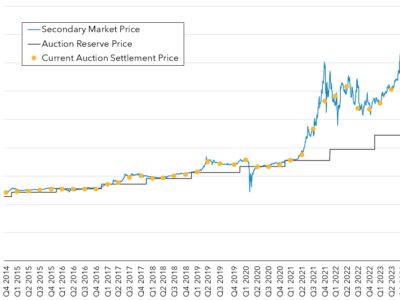The Congressional Back Door Attack on California’s Environmental Programs
California’s Environmental Programs
Today’s Los Angeles Times reports on disturbing, broad-based efforts in Congress that threaten to eviscerate a host of California’s cutting-edge environmental initiatives, most prominently its “Green Chemistry” program.
The saga begins with the California Legislature’s enactment of the state’s “Green Chemistry Initiative” (GCI) in 2008. The overarching principle behind GCI is to mandate the design of chemical products and processes in a way that reduces or eliminates the use and generation of hazardous substances. GCI represents a fundamental paradigm shift in manufacturing processes by focusing on environmental protection at the “front end,” design stage of production processes, as compared to the traditional approach of remediating hazardous materials after-the-fact, at the “back end” of the manufacturing and consumer cycles. Meanwhile, federal regulators–and the American public–are stuck with the Toxic Substances Control Act (TSCA), 1976 congressional legislation that has proven woefully inadequate in regulating and limiting hazardous substances in the marketplace. Under TSCA, USEPA can only regulate chemicals that have been proven dangerous. And, as the Times reports, only a fraction of the tens of thousands of chemicals currently on the U.S. market have ever been tested by federal regulators.
California’s GCI was initially scheduled to take effect on January 1, 2011. But the Schwarzenegger Administration failed to pursue implementation of GCI with the same energy and focus that it did AB 32, the Global Warming Solutions Act of 2006. The then-incoming Brown Administration had little choice but to postpone implementation of GCI beyond 2011, but it has since pursued implementation of the GCI legislation with far more dispatch its predecessor. Over the past three years, affected stakeholders–mainly large manufacturing interests–have tried without success to lobby California regulators to narrow the scope of the GCI, further delay its implementation, or both. So now those stakeholders have shifted their lobbying efforts to Washington, D.C.. and, specifically, Congress.
The Times reports that a bipartisan coalition in Congress is currently sponsoring a proposed Chemical Safety Improvement Act, legislation that would remedy some of the most egregious failures of TSCA. But the pending federal legislation represents a Trojan Horse to California officials and environmental groups, because it contains a provision preempting GCI and similar state measures around the country.
And it’s even worse than that. California Attorney General Kamala Harris told the Times that the federal Chemical Safety Improvement Act, if enacted, could preempt not only GCI but, also, California’s landmark Safe Drinking Water and Toxic Enforcement Act of 1986 (better known as Proposition 65). California Secretary for Environmental Protection Matt Rodriquez has written federal legislators warning that the federal bill’s preemption language is so sweeping that it “could jeopardize California’s ability to control greenhouse gases and thereby meet the state’s [greenhouse gas reduction] targets under AB 32…”
As the Times’ article notes, this legislation is only the most sweeping of several current Congressional attempts to supersede California environmental laws that business interests oppose. Efforts are also underway on Capitol Hill to preempt California’s Proposition 2, a successful 2008 initiative measure that prohibits the sale of eggs in California laid by hens confined to tiny cages; California’s ban on the sale of inefficient light bulbs; and the recently enacted California legislation prohibiting the sale or possession of shark fins in the Golden State.
Both Republicans and Democrats have proven themselves to be “situational federalists,” invoking states rights principles selectively, based on a particular factual context and set of political considerations. See, e.g., Legal Planet colleague Dan Farber’s post today on Texas’ seemingly unending efforts to halt USEPA’s regulation of greenhouse gases under the Clean Air Act. In the present case, however, California and the environmental community have every right to be alarmed at rear guard efforts by business interests to strangle California’s GCI and other progressive environmental policies in their crib, before they’re fully implemented.
Reader Comments
3 Replies to “The Congressional Back Door Attack on California’s Environmental Programs”
Comments are closed.








Rumors of the demise of California exceptionalism in environmental law are exaggerated. The Senate committee with jurisdiction is Environment and Public Works. Senator Boxer chairs that committee, which means she has an effective veto over any legislation within its jurisdiction. She is not currently a co-sponsor of S.1009. If the bill doesn’t take into account California’s interests, it probably won’t get passed.
With Kamala Harris lobbying against pre-emption, I would be surprised if Senator Boxer sold out her home state. Pre-emption will be on California’s terms, or not at all.
I very much hope you’re right.
Richard M. Frank Professor of Environmental Practice Director, California Environmental Law & Policy Center School of Law University of California Davis, CA 95616 Tel: (530) 752-7422 Fax: (530) 752-4704 E-mail: [email protected] Blog site: http://legalplanet.wordpress.com/ ________________________________________
And… http://www.sfgate.com/politics/article/Barbara-Boxer-pushes-ahead-on-chemical-safety-law-4699870.php
“Boxer said she will not permit legislation that usurps the ability of California and other states to regulate chemicals. She also demanded special protections for pregnant women, children and workers, deadlines for the Environmental Protection Agency to act, and protection of the right to sue. “If we don’t fix these problems, we’re not going to have a bill,” she said.”